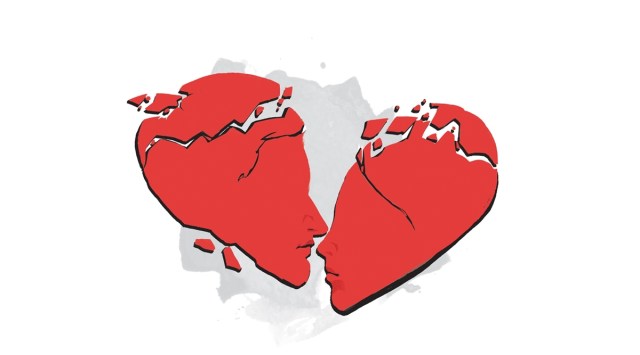In Manipur’s Kuki-Meiti clash, a fleeting love story, interrupted
As violence erupted in the state on May 3, the future of a young couple from the two communities who are torn apart seems uncertain
 Illustration: Suvajit Dey
Illustration: Suvajit Dey “Please try very hard to get this to her,” he said, handing over two stuffed black bags. One was crammed with food items like biscuits and dry cake that would last long, while the other had blankets, shawls, bed sheets and a phone charger. He paused for a moment before slipping two Rs 500 notes between the bed sheets. “Please tell her that it’s there. She doesn’t have any cash with her,” he said.
On Monday morning, the 27-year-old Meitei man handed over the two bags to these reporters to get them across to the 20-year-old Kuki woman he had first met this February in Imphal. Violence erupted in Manipur’s Churachandpur on May 3, during a rally by tribal students against the Meiteis’ demand for Scheduled Tribe status. As unrest spread across the state — with Kukis taking the brunt of the violence in Imphal — nearly 35,000 people have been displaced and 65 killed.
Like thousands of others, she too was shifted to one of the five relief camps in the city. Caught between a divided city, restricted access to high-security relief camps and restrictions on movements within Imphal, he was unsure of how to send assistance to her. A digital marketer with a foreign company, he works remotely from Imphal. She is employed with a hotel in one of the busiest markets in the city.
Arriving at the spot on a scooter with his father, the man, who has saved his girlfriend’s name followed by a heart emoji in his mobile phone, said they met while trekking at Cheirao Ching hill in Imphal. He said his parents were aware of his relationship with the Kuki woman, a fact confirmed by his father, and that they were just as concerned about her well-being as he was.
When news of violence spreading across the city reached her on May 3, she was out for a meal with friends. “We rushed back and reached the hotel but could not leave after that. I was there with four of my Kuki friends and hotel seniors, many of them Meitei,” she said.
When she called to tell him that she was trapped in the hotel, he started making plans to get her to his house, located in a Meitei locality, where he thought she could hide until the danger abated.
He recalled, “That evening, I called her mother to ask for permission for her stay in my family’s home. Her mother agreed but her hotel seniors advised that it would be better for her to stay at the hotel. They said it might not be safe and that a mob might find out that I was trying to protect her.”
While he landed up outside her hotel — under lockdown by the hotel authorities — in his car around 7 am the next day, she and her friends were looking for ways to reach the safety of a relief camp.
“The Kuki Students’ Organisation gave us contact numbers of many people but nothing worked out. Finally, my relative gave us the number of an MLA and he arranged for us to be escorted to a relief camp,” she said.
Once she was in the camp, communication got a little more difficult. Having forgotten her phone charger behind, she had to take turns borrowing one from others in the camp. There were other considerations too. “It was also a little difficult for her to talk to me because there were a lot of people from her community staying there at close quarters. They would not have been happy about us talking,” he said.
And then there were shortages in the camp, where thousands were housed together, of food, of any kind of comfort.
“I kept trying to find a way to get in touch with somebody working at the camp to get supplies to her but I failed. Then I found you people. I wish I had met you sooner,” he said.
Because on Monday afternoon, after the bags were handed to her that morning, she managed to find a spot in a vehicle with a security escort to Kangpokpi, about 40 km from Imphal. She is now staying at Kangpokpi with a friend’s relative.
On Monday, when the first mass movement of evacuees from Imphal to Churachandpur, 64 km away, and vice-versa took place, she failed to find a place among the 500-odd people who were escorted to her home town that day.
“I was unwilling to wait and was just happy to leave the camp. Even though I am not at home, I feel fine because I am with people of my tribe. … Once the situation is normal, I will go back to my family,” she said. Her mother later called up her boyfriend to thank him for the bags of food and other items.
The couple are aware that they are unlikely to see each other for a long time now. With the Internet still banned in Manipur, he is planning to fly to Guwahati in a few days to rejoin work as he has been finding it hard to explain the situation to his employers.
“I don’t know when we will meet again but her current situation is much better than when she was in the camp. I’m much happier that she is in a safe place now. That’s the most important thing,” he said.
Displaced from home and the place where she worked and had friends, she is unable to contemplate what her future looks like.
“I really don’t know. I am lost,” she said.







